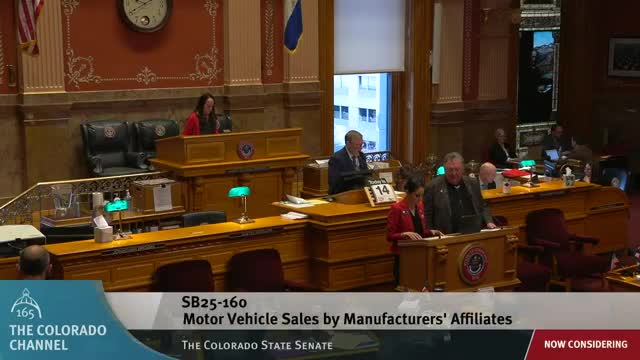Senate adopts bill to treat manufacturers' affiliates as manufacturers, limiting affiliate retail sales
Get AI-powered insights, summaries, and transcripts
Subscribe
Summary
The Colorado Senate on March 14 approved Senate Bill 160, which amends state motor vehicle franchise law to include manufacturersaffiliates in the statutory definition of "manufacturer" and to bar affiliates from operating dealerships in competition with their franchise dealers.
The Colorado Senate on March 14 approved Senate Bill 160, which amends state motor vehicle franchise law to include manufacturersaffiliates in the statutory definition of "manufacturer" and to bar affiliates from operating dealerships in competition with their franchise dealers. Sponsors of the bill included Senator Sarah Snyder and Senator Sarah Judah.
Why it matters: supporters said the change preserves protections for local franchise dealers, who they said collectively employ roughly 44,000 Coloradans, while preserving a pathway for manufacturers that do not operate franchise networks to sell directly. Opponents warned the bill could have unintended consequences for future independent electric-vehicle entrants and for powersports lines and urged caution about restricting direct-to-consumer options.
Bill details and floor action: Senate Bill 160 (sponsor list: Sen. Sarah Snyder, Sen. Sarah Judah; House co-sponsors: Representatives Hammock and Morrow) makes three targeted changes to Colorados motor vehicle franchise framework reported on the floor: it (1) defines who counts as an affiliate and includes affiliates in the definition of "manufacturer," (2) clarifies that manufacturers and their affiliates may not operate dealerships that compete with franchise dealers, and (3) preserves the existing path allowing manufacturers that do not use a franchise model to own and operate dealerships.
Two floor amendments offered by senators were adopted before final passage. Amendment L006, moved by Senator Sarah Judah, clarified that manufacturers may sell fleet vehicles to certain operators provided the sale is facilitated by a dealer and that warranty work may be performed by either the manufacturer or a dealer. Amendment L008, moved by Senator Sarah Snyder, aligned the bills powersports provisions with the motor vehicle statute so powersports dealers are covered in the same way as motor vehicle dealers. Both amendments were adopted on the floor by voice vote.
A proposed amendment, L009, that would have added a politically worded exception to the definition (drafted to exclude a manufacturer that "actively undermines American democracy") was offered by Senator Gonzalez and was rejected when the Senate voted against L009. A separate amendment, L007 (also referenced as L 0 0 7 on the floor), was defeated in a roll-call/division vote.
Debate highlights: supporters including Senator Snyder and backers in committee framed the bill as an update other states have adopted to prevent manufacturers or their affiliates from circumventing dealer networks while still allowing true new-market entrants that do not use the franchise model (the path used historically by Tesla and Rivian). Senator Sarah Liston and others emphasized the continuity of local dealers in communities and their economic role. Opponents, including Senator Henriksen, warned the measure could disadvantage small independent EV makers or future start-ups that are later acquired by incumbent manufacturers, and raised concerns about possible anti-competitive effects for certain powersports and motorcycle segments in bankruptcy or acquisition scenarios. The debate included repeated references to the brand "Scout" and to Volkswagens acquisition activity as the practical spur for the bill.
Statutory references and limits: the floor discussion repeatedly referenced Title 44 and the statutory definition in section cited on the floor as "44 21 0 2" (the definition of "manufacturer" under current Colorado statute) as the provision being amended. Sponsors said they worked with manufacturers to clarify language and to preserve explicit carve-outs for manufacturers that have no franchise dealers in Colorado.
Outcome and next steps: after extended debate and several amendment votes, the Senate adopted Senate Bill 160 on the floor by the voice vote recorded as "the ayes have it." Sponsors and supporters said the measure preserves dealer protections while allowing non-franchise entrants to compete. The bill will proceed under the normal enrollment and certification process following Senate passage.
Ending: The legislation drew both business and consumer-focused arguments on the Senate floor: backers emphasized jobs and local dealer investment; critics warned of unintended, anti-competitive effects for certain future business models. Sponsors said they will continue stakeholder work as the bill moves forward.
